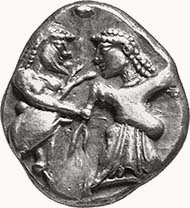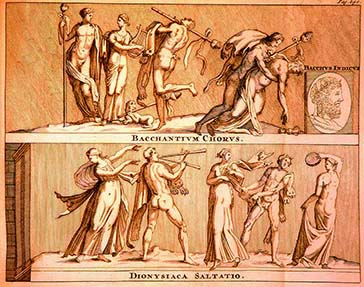mit freundlicher Genehmigung von Dr. Hans Voegtli / ACAMA
MACEDONIA. Unknown mint. Stater, 540-525 BC. Naked ithyphallic Satyr r. grabbing arm of Menad walking r. turning her head back to Satyr; in field one pellet. Rev. Incuse square diagonally divided. 9,91 grams. Svoronos, Hell. pl. 8, 4. SNG ANS 956 (same obv. die).
Most of us react uncomprehendingly while reading the Greek myths. We can’t imagine that once rational human beings were able to believe in gods who behaved like characters invented for a soap opera on TV. Legends tell us about adultery, violation, theft, intrigue and fraud. Zeus chases every pretty woman he spots, and his severe wife pursues the unfortunate mistresses. Hermes starts his career as thief and Hades rapes Persephone. Each member of the Greek pantheon has his own favorites and foes, and justice seems to have no place in mythology.
Two thousand years of Christianity have made it impossible for us to understand the entity of Greek belief. We will have to go back to the roots of religion, if we want to understand what a Greek meant, when he talked about Zeus, Athena or Dionysos.
Modern German scholars characterize the Greek form of religion as “Erlebnis-Religion”, as a religion of experience. This means that different sorts of experiences are brought into relation with different divine beings. When reality seems to fade, when suddenly normality is invalidated, when nothing is the same as it used to be a second ago, then – according to Greek belief – a god has engaged in human life. The way Dionysos interferes in the world of mortals is a good example that may illustrate this statement.
Dionysic festivities. Depiction from a Roman sarcophagus, sketched in 1696.
Dionysos was the god who was associated with the hidden side in human life. If we look around us today, we will see hundreds of businessmen wearing suits and ties, behaving strictly according to non-written conventions. But in every human being there is also another side, wild, licentious, uncivilized and completely different from the normal. Alcohol sometimes can reveal this hidden side. And so it was said that Dionysos presented wine to mankind. Actors forget their own personality for the length of a drama and play their role as somebody else. That is the reason, why the Greeks celebrated Dionysos with plays. Dionysos was the god of wild ivy known for its uninhibited growth. He took care of the free and uncultivated nature. He guarded the wild animals, which can be threatening, but beautiful, like the panther companion of the god. Dionysos is the complementary opposite of Apollo, god of moderation and self-control.
While most of us have restrained their wild side caused by 500 years of puritanical education, the Greeks accepted the right of Dionysos to a part of their life as natural. When Apollo had left Delphi in autumn time, then Dionysos took over the rule. His believers celebrated marvelous festivals and held wild processions. The dancing Menad with her flowing hair was part of it. At these processions, one could also see the Satyr who tried – incited by sexuel desire – to catch the Menad. In every day’s life the Menad was a good wife, sitting at home and weaving clothes for her husband; the Satyr was perhaps a backer or a farmer or a potter, in any case a citizen, who worked hard for a living. Both would have been ostracized, if they had committed adultery within the scope of their normal life. Not every drunk was possessed by the god! Only the religious ritual made it possible to meet with ones subconscious wishes and desires without violating the rules. While dancing in procession to honor Dionysos, every Greek could forget his normal life. Only joy and satisfaction mattered.
The obverse of our coin minted at an unknown place somewhere in Macedonia was inspired by these ideas. It was dedicated to the worship of Dionysos who was celebrated especially in the North of Greece where civilization came slowly and only a few Greek cities existed. Thracian and Macedonian coins often show images connected with the god Dionysos: The amphora full of wine for Terone, the vine for Maroneia, the ever rutting he-goat for Aigai and the ithyphallic ass for Mende, which in later times carries the god himself on his back. Our obverse shows the experience of Dionysos: the ecstasy of sexuality.
It was no wonder, that nobody wanted to understand these images during the repressed 19th century, and so the Greek belief was reduced to an obscure accumulation of funny stories. Ecstasy and sexuality were nothing but guilt and sin. The divine spark that once was inherent in this part of our being was extinguished.
L. Bruit Zaidman, P. Schmitt Pantel, Die Religion der Griechen, München 1994
M. Detienne, Dionysos à ciel ouvert, Paris 1986.
U. Kampmann, Gottheit und Polis, Stuttgart 1999.
J.-P. Vernant, L’univers, les Dieux, les Hommes, Paris 1999.








